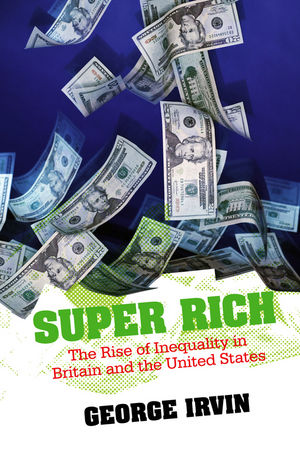Super Rich: The Rise of Inequality in Britain and the United StatesISBN: 978-0-7456-4464-6
Hardcover
272 pages
August 2008, Polity
 This is a Print-on-Demand title. It will be printed specifically to fill your order. Please allow an additional 10-15 days delivery time. The book is not returnable.
Other Available Formats: Paperback
|
||||||
Times Higher Education
"Irvin's book is timely and prescient. His analysis is thorough
and strongly supported with statistics, his support for a Nordic
model welfare state is eminently sensible and his defence of an
ideal of equality passionate."
Australian Journal of Political Science
"Will be of interest to anyone with a concern for inequality.
The book details uncomfortable home truths about economic
inequality and has many real-life examples which make for important
reading."
Sociology
"Super Rich discusses a truly real issue in today's
western economies and offers many intriguing insights, highly
recommended."
Midwest Book Review
"Last week the Dow tumbled below 10,000 and kept right on
falling. George Irvin explains what happened in his most timely new
book, Super Rich. With clarity and empathy ... he traces a
transatlantic tale of times good and then greedy."
Too Much
"During the last 25 years the economic and political histories
of Britain and the United States have shared many features; among
these is the prodigious enrichment of a small super rich minority
on the one hand, and the persistence of serious poverty on the
other. Irvin utilizes an impressively wide range of sources of data
and analysis to provide a provocative, enlightening and accessible
account of the growth of economic unjustice. This book should both
generate heated debate and provoke action."
Bob Sutcliffe, formerly of University of the Basque Country,
Bilbao
"The seemingly inexorable rise of inequality of income and
wealth is the social equivalent of global warming – except
that it is happening much more in some societies, notably the US
and the UK, than others, notably the Nordics. George Irvin provides
a fascinating account of the causes and the consequences of growing
inequality; and at the end a plausible agenda of public policy to
curb the rise without generating harmful societal side-effects. He
writes from a distinctly Left perspective; but unlike a lot of Left
writing the English here is accessible to the general reader, with
interesting facts and stories on every page. It is particularly
recommended for politicians and economists who declare that they
are concerned about poverty but not inequality, and for the police,
MI5 and the FBI who have to handle the consequences of
inequality-driven social distrust and unrest."
Robert Wade, London School of Economics



